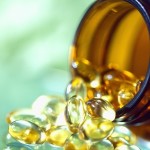DHA(docosahexaenoic acid) and EPA(Eicosapentaenoic acid) are both Omega-3 fatty acids naturally found in fish. Although the human body requires both for healthy function it is unable to produce sufficient quantities, consequently DHA and EPA must be attained through diet.
Memory, mental well-being and pregnancy – The many benefits of DHA
 Much research is taking place surrounding DHA’s relationship with brain function. It indicates people who consume more DHA have better memory, cognitive function and clearer thinking.
Much research is taking place surrounding DHA’s relationship with brain function. It indicates people who consume more DHA have better memory, cognitive function and clearer thinking.
Depression, bipolar disorder, dementia and suicide risk have all been linked to DHA deficiency. It plays an important role in mental well-being and regular intake has shown to reduce depression, anger, anxiety and aggression.
During foetal stages and in the first few days of life DHA is essential for the proper development of nerve and immune systems, the brain and the eyes. Mothers who take cod liver oil, rich in DHA, have healthier deliveries and their young children excel academically.
Heart health, immune function and inflammation – The many benefits of EPA
Essential fatty acid EPA;
• Reduces triglycerides
• improves circulation
• manages blood pressure
• supports the body’s anti-inflammatory response
• may prevent heart attacks
Strong evidence of the benefits for cardiovascular health from consuming fish oil lead to the American Heart Association
recommending that people with heart disease or high triglycerides take at least 1 gram of EPA and DHA combined every day.
EPA helps to stimulate the production of eicosanoids within muscle and joint tissue, which naturally reduces inflammation. Arthritis, asthma and inflammatory bowel disease may all be helped by taking EPA.

The best source of EPA and DHA
The average western diet is high in Omega-6 fats like vegetable oil, processed foods and meat but greatly lacks Omega-3 fats. Another problem includes factors that limit Omega-3 absorption;
• Low levels of key vitamins and minerals
• a poor diet, high in saturated and trans fats
• Alcohol consumption
• Certain medications
• Aging
With the growing concern of high toxicity levels in our oceans and fish as well as factors that restrict Omega-3 absorption it can be difficult to satisfy the daily recommendation 500mg of EPA and DHA. Research shows that the most effective source of Omega-3 fatty acids is quality fish oil supplement. Look for one that is fresh, molecular distilled, and pure and free of any environmental contaminants.
5th December 2011 The Medical Sanctuary
